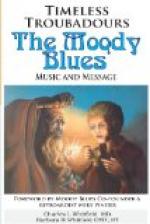("It is no wonder if I sing better than any other singer, for my heart draws nearer to love and I am better made for love’s command.”) The troubadour amor, especially in its Italian development, eventually attained the moral power of the minne; but in its early stages, it was a personal and selfish influence. The stanza form and rime distribution of the minnesinger poems continually betray Provencal influence: the principle of tripartition is constantly followed and the arrangement of rimes is often a repetition of that adopted in troubadour stanzas. Friedrich von Hausen, the Count Rudolf von Fenis, Heinrich von Morungen and others sometimes translate almost literally from troubadour poetry, though these imitations do not justify the lines of Uhland.
In den Thaelern der Provence ist der Minnesang
entsprossen,
Kind des Fruehlings und der Minne, holder,
inniger Genossen.
Northern France, the home of epic poetry, also possessed an indigenous lyric poetry, including spring and dance songs, pastorals, romances, and “chansons de toile.” Provencal influence here was inevitable. It is apparent in the form and content of poems, in the attempt to remodel [130] Provencal poems by altering the words to French forms, and by the fact that Provencal poems are found in MS. collections of French lyrics. Provencal poetry first became known in Northern France from the East, by means of the crusaders and not, as might be expected, by intercommunication in the centre of the country. The centre of Provencal influence in Northern France seems to have been the court of Eleanor of Poitiers the wife of Henry II. of England and the court of her daughter, Marie of Champagne. Here knights and ladies attempted to form a legal code governing love affairs, of which a Latin edition exists in the De arte honeste amandi of Andre le Chapelain, written at the outset of the thirteenth century. Well-known troubadours such as Bertran de Born and Bernart de Ventadour visited Eleanor’s court and the theory of courtly love found its way into epic poetry in the hands of Chretien de Troyes.
The Provencal school in Northern France began during the latter half of the twelfth century. The chanson properly so called is naturally most strongly represented: but the Provencal forms, the tencon (Prov. tenso) and a variant of it, the jeu-parti (Prov. jocs partitz or partimens) are also found, especially the latter. This was so called, because the opener of the debate proposed two alternatives to his interlocutor, of which the latter could choose for support either that [131] he preferred, the proposer taking the other contrary proposition: the contestants often left the decision in an envoi to one or more arbitrators by common consent. Misinterpretation of the language of these envois gave rise to the legend concerning the “courts of love,” as we have stated




